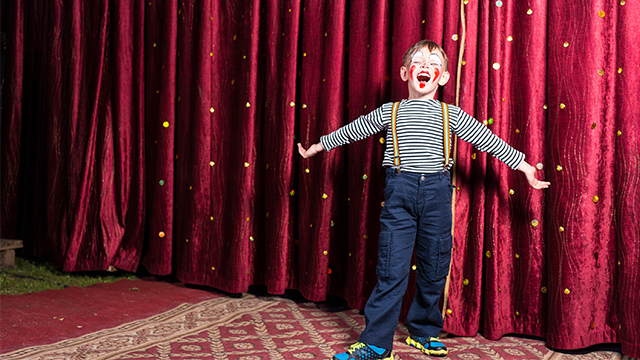10 Ways to Keep Calm, Cool, and Collected in the Audition Room
Written by Meghan Mitchell
April 7, 2017
Are you having trouble staying at ease in the audition room? Are your nerves always getting the best of you? There are many ways to prepare for the rigors of auditioning, and many tricks to keeping your cool through all the stress and anxiety of auditions. The pressure is on… you never know, it might just be this audition that lands you your Dream Job! But sometimes acquiring that dream requires a lengthy and arduous audition process. Here are some helpful tips and tricks to keep calm and carry on when auditioning.
1. Prepare, prepare, prepare.

There is a famous quote from Julie Andrews, “Amateurs practice until they get it right; professionals practice until they can’t get it wrong.” No one likes to freeze in an audition room, or go up on your monologue. Michael Jordan used to practice his free throws until he couldn’t possibly miss—what makes acting or singing any different? Practice truly does make perfect. When you are confident with your lines and words, your acting beats and singing notes, there is nothing that will happen in the room that will shake you.
2. Take a breath.

Don’t forget to breathe! Seems simple, right? When you are in the audition room, or better yet, when you are about to walk into the room, take a moment for yourself to just… breathe. Don’t jump into your song if you aren’t mentally prepared to do so. Don’t begin your monologue if you haven’t seen your “other” (your invisible partner), and taken a moment to acknowledge your “moment before”. No one will fault you for taking a second to breathe, prepare, and be ready to truly present your best self.
3. Focus your attention.

There is an awful lot of noise in an audition holding room and it may seem impossible to get away from it all. All of that nervous energy may potentially eek into your performance in the audition room. Yes, it is good to see your friends and chat to make the time pass, but the room can be overwhelming. Don’t let others get into your head—bring a book, bring headphones, better yet, leave the room after you’ve checked in! Take a minute to go to your car, run through your audition; find some time away from the hundreds of people in the room to center yourself. When the energy is too much, know that you have the power to separate yourself from the craziness and find your center again.
4. Communicate…

…to your pianist, to the auditor, to anyone who will help you succeed in the audition room. Make sure your music is clearly marked with a start and an end. Are you starting with a bell tone? Are you using a few measures before you start singing? There are different schools of thought on giving your pianist your tempo—I always like to softly hum the first line of the song to them to get a feel for the tempo. Did you ask the auditor if you should slate your pieces? Introduce yourself? Once you know what to expect and what is expected of you, you are ready to make your first impression a confident one!
5. How are you walking into the room?

Everyone does it, but does everyone think about it? The moment you come in the door, the casting team will see you for the first time. They are getting a feel for you as a person—is this someone they want to work with? Are you friendly, loud, quiet, or scared? How you present yourself begins the moment you enter the room. Practice this yourself, or with friends; find out how to be comfortable in being yourself when you make that first impression. Leave the nerves at the door!
6. Focus on your first line.

If it is a song or monologue, your first moment or your first line, you should bring the casting team into this world you’ve created for your piece. You want to start your piece with a bang! Start on a hot note; make them listen—after you have their attention, you then have the freedom to concentrate on you because you’re not grasping for their focus. You should leave the room with everyone’s attention in the palm of your hand—reel them in, draw them to you right from the start. If you set your monologue/song up for success from the start, it will pave the way for the rest of your time in the room.
7. Don’t speculate.

Is someone before you singing two songs when they only asked for one? Are some people coming out with sides to read? When you’re in the room, are the casting directors looking at their phones or staring at your resume? Whatever is happening inside or outside of the audition room, there is no point in speculating what is happening with anyone else. Keep your concentration—remember to focus on you. The best thing to do after an audition is to forget about it. Know you did your best and keep your speculations out of the picture when you’re both in, and out, of the room.
8. Be ready and open for anything.

In the audition room, anything can happen. Have you been asked to do your monologue in a Southern dialect? Sing another 16 bar cut? You may find yourself telling a joke or harmonizing to Happy Birthday — always be open to anything, but also, don’t be afraid to ask for a second to prepare. Don’t hesitate to ask the panel for a second to think through your monologue in a different voice, or take a look at a cut of your song you may be not entirely comfortable with. Don’t feel pressure to perform on the spot. You can take a moment to, once again, just breathe.
9. Know your special skills.

Has it been awhile since you’ve sight read? How about an accent you had once in college, but are unsure of now? Everything on your special skills should be something you can do at the drop of a hat. Card tricks? Always have a deck on you. Cello skills? Is your instrument close by, or do you have a video that you can give to the casting team? Make sure you know your special skills and can deliver at a moment’s notice with confidence!
10. Enjoy yourself.

Some say that auditioning is the job, and working on a show is simply a bonus. You will audition millions of times in your life, and sometimes it can take years to land that job you’ve always wanted. As a performer, you must take comfort in knowing that you have put your best foot forward. There will be good auditions, there will be bad ones, but it’s how you carry yourself in stride that determines your character as a performer and a professional.
Every time you audition, you’re getting to perform! Treat every audition as a performance. Enjoy those moments! It is the passion of theatre that drives us to audition and put our emotions on the line in the first place. Take a breath, take your moment, and love every minute of it.
Need some advice? We’ve got you covered.
- Pre-Show Rituals from Actors Across the US
- 5 Advantages of Learning Stage Combat
- 5 Ways to Accept (and Love) Your Look
- 5 Reasons You Shouldn’t Let a Bad Audition Define You
- 5 Tips for Nailing Your College Music Theatre Audition
- 10 Tips on Owning the Room at Competition
- How to Balance Theatre and Coursework
- The 10 Secrets of Great Understudying
- 10 Items Every Actor Should Carry in Their Rehearsal Bag
- 10 Items Every Dancer Should Keep in Their Rehearsal Bag
- 10 Remedies to Help Your Throat Survive Audition Season
